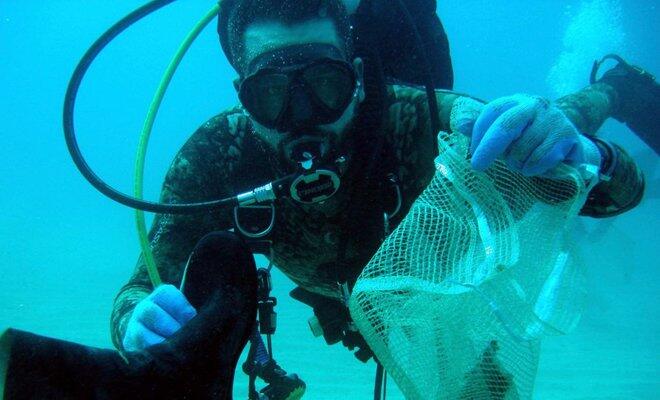TABARJA: The Lebanese divers plunge below the surface, scuba tanks on their backs and nets in hand. But what they are looking for under the ocean surface is not treasure, it is trash.
The group is conducting a clean-up below the waves, one of many initiatives emerging from Lebanon’s civil society and private sector in response to the government’s failure to address a long-running garbage crisis.
The dive, off the town of Tabarja, 25 km north of Beirut, proved fruitful: The divers emerged with nets full of plastic and glass bottles, rusted drink and food cans and even tires, as a few swimmers nearby looked on bemused.
“What we saw down there, it makes your heart hurt,” said Christian Nader, a 19-year-old student, who has been diving for five years.
The event was organized by Live Love Beirut, a group of Lebanese working to promote a positive image of their country, who said more than 100 divers joined clean-ups at eight sites throughout the country over two days.
“It’s sad, it’s our sea. There should be awareness campaigns, the state should help us clean,” Nader said.
But Lebanon’s government has proved serially unable to address the country’s rubbish crisis, which reached catastrophic proportions in the summer of 2015.
Mountains of trash piled up in the streets of Beirut and its surroundings after the nation’s largest dump closed down.
That site had been years overdue for closure, and the government had pledged to find an alternative before it was shuttered but failed to do so in time.
So there was nowhere for collectors to send the rubbish produced by the 2 million residents of Beirut and its environs.
Experts warn the nightmare scenario could soon be repeated thanks to the government’s continued failure to adopt a comprehensive waste management strategy, even as the country produces 6,000 tons of refuse a day.
In response to the 2015 crisis, and the massive demonstrations it provoked, the government in March 2016 approved a “temporary” plan to reopen two long-closed dumps in the Beirut area.
But the massive backlog created by months of accumulating and uncollected trash meant the two sites quickly reached capacity.
Authorities are now examining the possibility of expanding the sites.
“The government must start to think seriously about lasting solutions and start putting them in place, even if it’s little by little,” said Lama Bashour, head of the Ecocentra environmental consultancy.
Like many experts, she emphasised the importance of “sorting and recycling” waste.
EU funds have helped pay for several sorting and composting facilities in Lebanon, but there are still more than 900 unlicensed dumps nationwide, according to an official study.
“The government should first of all have a strategy,” said Farouk Merhebi, a waste management expert.
“By 1997, it was an emergency plan. Today we are in 2017, and we are still in an emergency plan. So we are reacting, we don’t plan for the future.”
He said the failure to produce a proper strategy had dire consequences.
“Any region where there is no waste management facility, they are resorting to burning of the waste. Most of the municipalities burn their waste.”
Despite the large quantity of recyclable material being deposed of each day, just 15 percent of it is actually recycled, according to a source with knowledge of the sector.
The government is reportedly now studying a plan that would seek to decrease waste and boost recycling, something that Ziad Abi Chaker, of the company Cedar Environmental, has long called for.
Source: http://bit.ly/2k3lpMk











